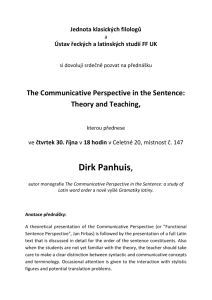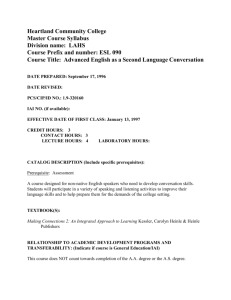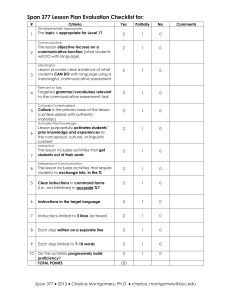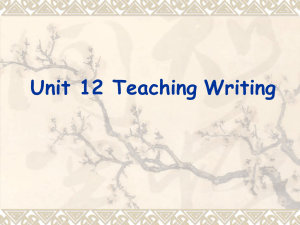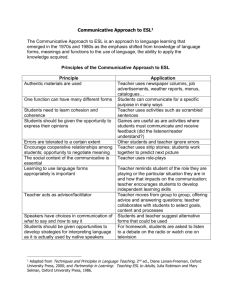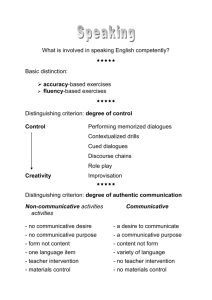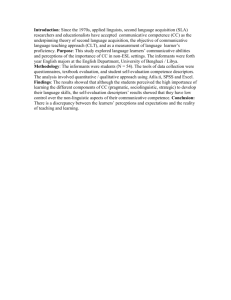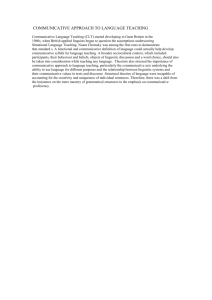642 COMMUNICATIVE STRATEGIES IN TEACHING ENGLISH FOR
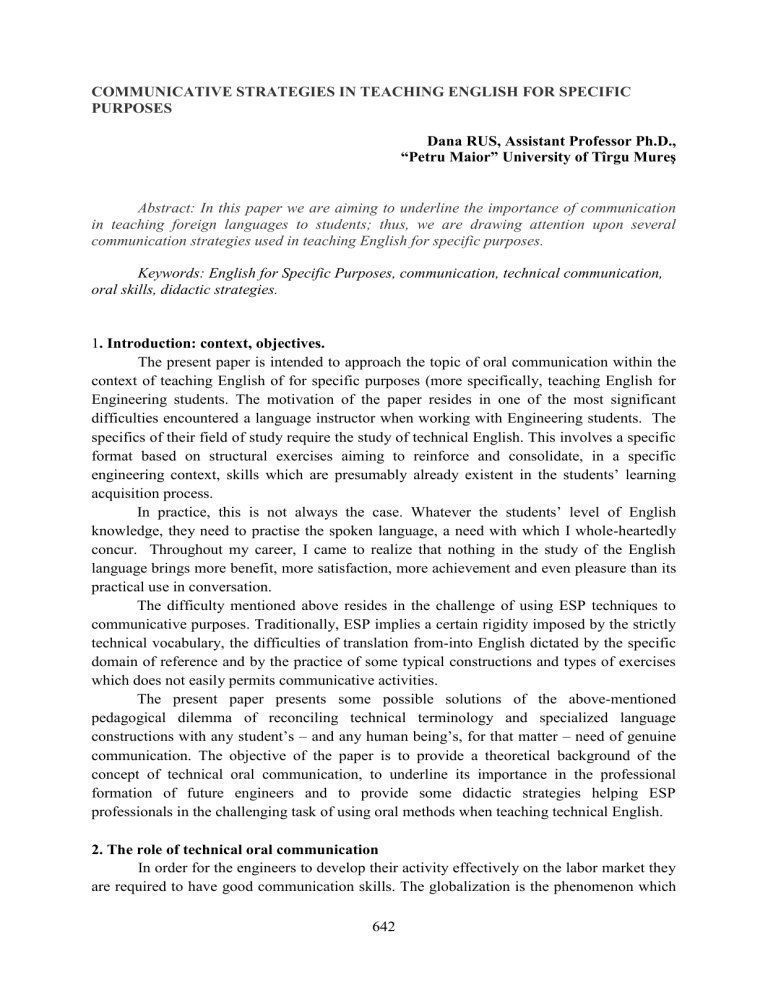
COMMUNICATIVE STRATEGIES IN TEACHING ENGLISH FOR SPECIFIC
PURPOSES
Dana RUS, Assistant Professor Ph.D.,
“Petru Maior” University of Tîrgu Mureş
Abstract: In this paper we are aiming to underline the importance of communication in teaching foreign languages to students; thus, we are drawing attention upon several communication strategies used in teaching English for specific purposes.
Keywords: English for Specific Purposes, communication, technical communication, oral skills, didactic strategies.
1 . Introduction: context, objectives.
The present paper is intended to approach the topic of oral communication within the context of teaching English of for specific purposes (more specifically, teaching English for
Engineering students. The motivation of the paper resides in one of the most significant difficulties encountered a language instructor when working with Engineering students. The specifics of their field of study require the study of technical English. This involves a specific format based on structural exercises aiming to reinforce and consolidate, in a specific engineering context, skills which are presumably already existent in the students’ learning acquisition process.
In practice, this is not always the case. Whatever the students’ level of English knowledge, they need to practise the spoken language, a need with which I whole-heartedly concur. Throughout my career, I came to realize that nothing in the study of the English language brings more benefit, more satisfaction, more achievement and even pleasure than its practical use in conversation.
The difficulty mentioned above resides in the challenge of using ESP techniques to communicative purposes. Traditionally, ESP implies a certain rigidity imposed by the strictly technical vocabulary, the difficulties of translation from-into English dictated by the specific domain of reference and by the practice of some typical constructions and types of exercises which does not easily permits communicative activities.
The present paper presents some possible solutions of the above-mentioned pedagogical dilemma of reconciling technical terminology and specialized language constructions with any student’s – and any human being’s, for that matter – need of genuine communication. The objective of the paper is to provide a theoretical background of the concept of technical oral communication, to underline its importance in the professional formation of future engineers and to provide some didactic strategies helping ESP professionals in the challenging task of using oral methods when teaching technical English.
2. The role of technical oral communication
In order for the engineers to develop their activity effectively on the labor market they are required to have good communication skills. The globalization is the phenomenon which
642
has triggered a re-definition and reconsideration of priorities in the industrial world and not only. The standardization of business practices, of products and services, the existence and increasing dominance of multinational companies, the current practices of frequent relocations and outsourcing has lead to a dramatic reconsideration of the importance of oral communication as a means of performing well in an increasingly competitive industrial market. This globalizing phenomenon will not go away any time soon; therefore, the need for proficient oral communicators is here to stay.
Engineers – as many other professions for that matter - find themselves confronted with this double task. On the one hand, in order to be competitive, they still need to be good professionals, they need to have a good mastery of their fundamental object of study. On the other hand, in order to put this proficient mastery to good use and to function adequately in an industrial environment, they must also possess good communication skills, not only in their native language, but also in English. This combination of technical and non-technical skills is likely to bring engineers’ success on an increasingly demanding and sophisticated labor market which requires more and more from its actors.
Kakepoto (2012) identifies other names by which oral skills are known and referred to on the labor market: soft skills, generic skills or employability skills. They all are used interchangeably to refer to a current condition of a successful engineer. Individuals whose professional competence is doubled by communication skills are more likely to perform well at the working place, to create and maintain good relations with the employers, subordinate staff, clients, to contribute to the consolidation of the company image and therefore create added value for the organization. The importance of oral communication for engineers in industry is acknowledged by Dannels (2003) and Korte et al. (2008), while a study by Tilli and Trevelyan (2008) found that 60% of the time spent by an engineer in the company is occupied by communicating (qtd in Kakepoto 2002).
When finding an engineering job, it is increasingly important for the applicant to be fluent not only in his/her native language, but also in at least another foreign one, which is
English. The idea of ‘successful candidate’ has changed so much that employers are currently looking for good communicators who, through their skills, are likely to boost the profit of the company.
Among the situations requiring communication skills in an engineering profession, the most notable would be the discussion, the oral presentation, the participation in meetings, in negotiations, the instructions, the conversation on the phone and other similar communication media.
Engineering students are also required to make proof of their oral communication skills in a variety of circumstances. Among these, the most relevant are: the oral responses during seminars, courses and laboratory works, oral projects, presentations, participations in students’ conferences, oral presentation of reports, of practical activities, oral exams and colloquia, final defenses of their graduation papers. Moreover, one of the most important circumstances when they need to display proficient oral skills and sufficient practice of oral communication is the job interview.
Considering the important role that communicative skills have in the profile of a successful engineer, one observation is natural: speaking practice within ESP classes should gain a more prominent status.
643
3. Features of technical oral productions
Dannels (2002) identifies five important features related to speaking in the field of engineering. These are:
1. Simplicity. A technical speech in the field of engineering should be primarily simple, devoid of figures of speech, without stylistic ornaments and figurative meaning. It should provide to-the-point, factual, practical information. Nevertheless, it should not become too dry and rudimentary.
2.Persuasiveness. A good technical speaker should attract the audience and convince them. He / she should bring arguments / counterarguments supported by relevant proofs in order to maintain a certain idea or principle.
3. Results-oriented. The production of any communicative act in the sphere of engineering is directly linked to a certain result. In order for the speech to be successful, it must take into account the audience and the communicative purpose in order to assess the expected result. The result is dependent on the specific situation of the speech act, for example: - observance of instructions (instructions);
- successful negotiations (negotiations);
- accurate exchange of information (conversation, discussion);
- accurate transmission of technical information (report);
- promotion to a better position within the company (negotiation);
- finding a convenient job (job interview);
- proving professional proficiency (conference paper);
- proving adequate academic training (final paper defense) etc.
4. Numerically-rich. Engineering is traditionally a domain of figures. A speaker who intends to make a good impression, to be credible and to meet his/her objectives will support his ideas, opinions, descriptions of processes etc. with relevant figures.
5. Visually sophisticated. The reason why technical communication is called
‘technical’ is not only its belonging to the sphere of the technical sciences. For the most part, the specific technical communication acts make intensive use of a varied range of visual aids such as posters, power-point presentations, tables, charts, diagrams etc.
Bearing in mind the characteristics above, the language instructor must make sure that students are provided with enough stimuli for conversation and confronted with enough communicative activities in order for them to create and reinforce this specific skill in a technical context. Students need not only to practise the language as such; they must apply the above-mentioned criteria to their oral productions in such a way that they should be able to create effective and accurate communication acts. While focusing on the technical aspect of the speech, which also requires knowledge and concentration, students simultaneously have to incorporate what is defined as ‘general language’ , i.e. they need to practise structures such as: expressing opinion, giving arguments / counterarguments, defining, giving instructions, describing, summarizing etc. It is the instructor’s job to create communication situations which should be the meeting point of all these requirements and, additionally, they should also be entertaining and attractive in order to keep students’ interest alive, boost their motivation and increase their sense of achievement.
644
4. Methodological tools used in teaching ESP oral communication
Adriana Vizental (2007:208) identifies two basic modes of oral communication: the conversational (dialogic) mode and the expositional (monologic) one. Both modes can be applied to the purposes of practicing oral skills in Engineering students, as there is a variety of oral communication models with their inherent features.
The conversational mode resembles more natural communication, as it implies faceto-face communication and a rapid exchange of replies. A. Vizental mentions the following types of activities characterizing the conversational mode: “question-answer exchanges, brainstorming, conversation, simulation, role-play, improvisation, discussion, debate” (209).
These activities can be used in a variety of activities in which students become involved and which they appreciate. Here are some possible applications:
1. The classical “yes-no” speaking game (method used: question-answer exchanges).
One student thinks of a specific engineering object which is characteristic of their field of study, e.g. ‘insulator’. The rest of the students must find the word by asking questions, but they are allowed to ask only ‘yes-no’ questions.
Sample questions: “Is is a piece of equipment?” “Can it be plugged?” “Can you see it in this room?” “Is it a material?” “Can current pass through it?” “Is it an insulator”? The student who asks the final question will take the first student’s place.
2. A dice speaking game (method used: brainstorming).
The instructor writes on the board the numbers from 1 to 6 and a letter from the alphabet corresponding to each number. Each student rolls the dice and they need to say one word beginning with the corresponding letter on the board. The word must belong to their engineering profile and words cannot be repeated. e.g. “A” – “amplifier”, “aerial”, “alternator” etc. are acceptable; “apple” is not. This activity is good as a warmer.
3. Time travelling (method used: question-answer, simulation, improvisation, roleplay).
One students is called in front of the class, facing his/her colleagues. The student in front of the class pretends to be a time traveler from the distant past. The instructor writes a word on the board, which is seen only by the students’ colleagues. The word belongs to the technical sphere: remote control, robot, e-mail, computer, car, loudspeakers etc. The students in the class need to describe the object to the time traveler in words that he/she will understand (no reference to electricity, internet, television, fuel etc) until he/she guesses the word. This exercise is a good practice of language registers and it is also useful in revising definitions. As a follow-up, students are then required to produce the contemporary, technical definitions of the terms.
4. Which course? (debate, discussion)
The students work in pairs. They need to decide upon a new course which they would like to see integrated into the academic curriculum for engineering and discuss its advantages and importance in an engineer’s professional formation. Alternatively, the two students can choose a course which they have studied / are going to study, a course which, in their opinion, has the highest relevance for the engineering profile. They will bring arguments in favor of their favorite course, anticipate their colleague’s counterarguments and discuss until one of the student accepts the other student’s arguments.
645
5. Find the difference (conversation, question-answer)
The students work in pairs. They are both given images of a technical representation of some kind (an electronic circuit, a representation of the electric motor, the layout of a factory etc). There are small differences between the two pictures, differences which they need to identify. This exercise works well with engineering students, who are traditionally inclined to working with visual representations, figures and measures.
The expositional mode of oral communication implies that the speaker speaks freely, in front of an audience, on a given subject. This mode has its specific relevance for a future engineer’s development. If the conversational mode imitated natural communication in a controlled environment, the expositional mode prepares the student for the tasks that he/she will be confronted with both at the workplace (making oral presentations, presenting technical reports, etc) and as part of the academic requirements (oral exams, final paper defense etc).
In order to exercise the skills which are required for an efficient practice of the expositional mode, students can be asked to participate in a wide range of activities, among which we mention the following tasks:
1. Prepare a 1-minute speech on one of the following topics: The importance of engineering in your life; Internet and the Engineering career; My favorite University course,
Prospects of the Engineering Career, The applications of automation; The applications of electricity; Saving energy; etc.
2. Prepare a 10-minute speech on one of the themes above (students are given the assignment at the beginning of the semester and they need to do basic research in order to prepare their speeches);
3. Project work: the students are given a common project which they prepare during the semester and present during the exam. Each team member has a clearly defined task within the group and the results of the project are presented by using a diverse range of visuals which are specific for the engineering projects (PowerPoint presentations, graphs, tables, charts, other figures).
5. Conclusions.
University curricula must adapt their requirements in order to prepare engineering students who should be successful on an increasingly competitive labor market, in the conditions of the growing importance of communication skills. The practice of different models of oral communication in the technical field will equip the students with the theoretical background and with the actual experience which will enable them to perform effectively in real communication situations.
The difficulties encountered by both language instructors and engineering students, those of integrating speaking strategies within the somehow rigid structure and fixed format of English for Specific Purposes can be overcome by devising new methodological tools, inspired from the students’ field of interest. These didactic strategies are tailor-made to meet their communication needs while preserving at the same time the technical character which is required from engineering students’ language training.
646
Bibliography
Dannels, D. P. (2002). Communication across the curriculum and in the disciplines. Speaking in engineering.Communication Education, 51(3), 254-268
Kakepoto, Inayatullah (2012). Perspectives on Oral Communication Skills for Engineers in
Engineering Profession in Pakistan, http://www.ijalel.org/pdf/129.pdf
. Accessed October 20.
Korte, S. Sheppard, and W. Jordan (2008). A qualitative study of the early work experiences of recent graduates in engineering, in Proceedings of ASEE annual conference.
Tilly, S., Trevelyan, J.P. (2008). Longitudinal Study of Australian Engineering Graduates.
Paper presented at the American Society of Engineering Education Annual Conference,
Pittsburgh.
Vizental, Adriana (2007). Metodica predarii limbii engleze. Strategies of Teaching and
Testing English as a Foreign Language. Iasi: Polirom.
647
